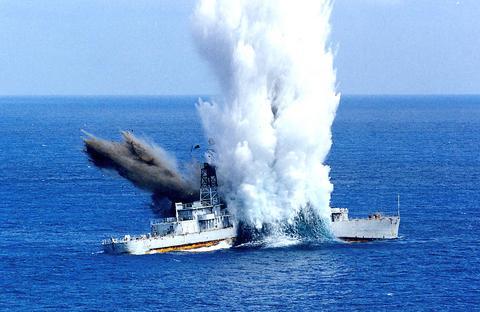The navy regained its self-confidence yesterday after a successful torpedo test.
The success came after the navy failed to hit a target in the Sept. 4 Hankuang No. 19 exercise.
The first of two torpedoes fired yesterday developed similar problems as the one in the Hankuang, or Han Glory, exercise and failed to hit its target.

PHOTO: REUTERS
But a second try yesterday worked, marking the first success the navy has had in two decades in firing a live torpedo from a submarine.
The torpedo tests were held at a beach in Chialutang, Pingtung County.
The result cheered up navy commander-in-chief Admiral Miao Yung-ching (
"It has helped us regain self-confidence," Miao said in a brief speech after the torpedo tests. "It will also make the public have confidence in us again."
"Despite the success, we will seek to find out what caused the other tests to fail to ensure that no mistakes of the same kind are made again," Miao said.
Yesterday's tests were intended to make up for the navy's failures in the Hankuang exercise, which included a live submarine-launched torpedo and a land-based Chaparral air defense missile. The Chaparral is used by the marine corps.
It was President Chen Shui-bian's (陳水扁) idea that the navy and other armed services launch more tests of weapons systems that developed problems in the Hankuang exercise until they were able to hit the target without fault.
Torpedoes were not the only weapons put to the test in yesterday's live-fire drills.
The Mica air-to-air missile and the Chaparral missile were also tested. Both hit their targets.
The Mica was not launched during the Hankuang exercise because its intended target was mistakenly shot down by a Standard SM-1 missile fired from a Chengkung-class frigate.
The Chaparral was off the mark in the Hankuang exercise.
After the Mica and Chaparral passed the tests, the navy's heavyweight SUT torpedo became the center of attention. The navy had been preparing for the SUT test for several weeks. The navy had fired another live torpedo in a rehearsal on Oct. 8. The test was successful, but could not be officially counted.
The training drills yesterday were supposed to have been completed by noon, but were extended after the first SUT torpedo went out of control.
Initial probes by the navy showed that the wire guiding the torpedo broke during the homing process, a situation similar to what happened in the Hankuang exercise.
The navy said the torpedo sank to the bottom of the sea about 53 minutes after it lost contact with the submarine.
The sea where the torpedo test was held was up to 1,571m deep, the navy said.
"After its batteries run out, the torpedo will sink to the seabed," it said.
A second torpedo test took place at 2:20pm. Six minutes later, the torpedo hit a decommissioned Yang-class destroyer, about 60 nautical miles off the coast.

An essay competition jointly organized by a local writing society and a publisher affiliated with the Chinese Communist Party (CCP) might have contravened the Act Governing Relations Between the People of the Taiwan Area and the Mainland Area (臺灣地區與大陸地區人民關係條例), the Mainland Affairs Council (MAC) said on Thursday. “In this case, the partner organization is clearly an agency under the CCP’s Fujian Provincial Committee,” MAC Deputy Minister and spokesperson Liang Wen-chieh (梁文傑) said at a news briefing in Taipei. “It also involves bringing Taiwanese students to China with all-expenses-paid arrangements to attend award ceremonies and camps,” Liang said. Those two “characteristics” are typically sufficient

A magnitude 5.9 earthquake that struck about 33km off the coast of Hualien City was the "main shock" in a series of quakes in the area, with aftershocks expected over the next three days, the Central Weather Administration (CWA) said yesterday. Prior to the magnitude 5.9 quake shaking most of Taiwan at 6:53pm yesterday, six other earthquakes stronger than a magnitude of 4, starting with a magnitude 5.5 quake at 6:09pm, occurred in the area. CWA Seismological Center Director Wu Chien-fu (吳健富) confirmed that the quakes were all part of the same series and that the magnitude 5.5 temblor was

The brilliant blue waters, thick foliage and bucolic atmosphere on this seemingly idyllic archipelago deep in the Pacific Ocean belie the key role it now plays in a titanic geopolitical struggle. Palau is again on the front line as China, and the US and its allies prepare their forces in an intensifying contest for control over the Asia-Pacific region. The democratic nation of just 17,000 people hosts US-controlled airstrips and soon-to-be-completed radar installations that the US military describes as “critical” to monitoring vast swathes of water and airspace. It is also a key piece of the second island chain, a string of

The Central Weather Administration has issued a heat alert for southeastern Taiwan, warning of temperatures as high as 36°C today, while alerting some coastal areas of strong winds later in the day. Kaohsiung’s Neimen District (內門) and Pingtung County’s Neipu Township (內埔) are under an orange heat alert, which warns of temperatures as high as 36°C for three consecutive days, the CWA said, citing southwest winds. The heat would also extend to Tainan’s Nansi (楠西) and Yujing (玉井) districts, as well as Pingtung’s Gaoshu (高樹), Yanpu (鹽埔) and Majia (瑪家) townships, it said, forecasting highs of up to 36°C in those areas